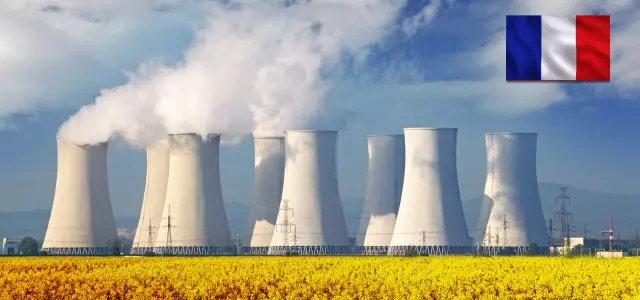
This article originally ran on Forbes.com on November 4, 2024. All rights reserved.
Daniel B. Markind is a Forbes.com energy column contributor. The views expressed in this article are not to be associated with the views of Flaster Greenberg PC.
Ever since the beginning of the Israeli assault on Hezbollah in Lebanon, France’s President Emmanuel Macron has been taking an increasingly strong public stance against the actions of the Jewish State, if not against the country itself. On October 7, Macron demanded an arms embargo against Israel. This resulted in criticism even from members of his own party. (Source)
Acrimony between Macron and Israeli Prime Minister Benjamin Netanyahu continued throughout October. Most recently, on October 24, Macron stepped up the criticism, accusing Israel of “sowing barbarism’, and drawing yet another sharp rebuke from Netanyahu. (Source).
Macron’s increasing stridency has surprised even members of his own party. Perhaps he is trying to follow the French Gaullist tradition in staking out positions that contrast with whatever the Americans seem comfortable with in an attempt to assert French leadership, (Source) but a closer look indicates that his pronouncements may have more to do with economic interests than with any real change in ideology.
A case in point is France’s increasing involvement with Qatar. In February, Macron announced that France was entering into a €10B strategic partnership with Qatar “to the mutual benefit of both countries.” (Source). Paris is interested in selling weapons, including aircraft, to the gas-rich emirates. (Source). Qatar’s sovereign wealth fund also has investments in top-tier French hotels (Source), luxury goods companies and retail. (Source).
The question all of this now raises is how much influence Qatari investments, fueled by extraordinary oil wealth, may be having over French foreign policy. Despite having a population of only 350,000 citizens out of 3 million residents (most of whom are there on work visas (Source), Qatar boasts oil reserves estimated at 25.2 billion barrels, making it the 13th largest in the world (Source). However, more importantly, Qatar was also the world’s third-largest exporter of liquefied natural gas (LNG), after the U.S. and Australia, as of 2022, and it shares the South Pars gas field (Source) with Iran.
Doha has used this extraordinary wealth to carve out a central role in world affairs by funding the Muslim Brotherhood, a global Islamist movement that Hamas belongs to, and weaponizing Al Jazeera, a multi-lingual international TV channel (Source). This role has been magnified since the October 7 Hamas holiday attacks in Israel. Meanwhile, many of the Hamas political leaders live in Qatar’s capital, Doha.
France is interested in expanding its relations not just with Qatar, but also with Iran. It started by cooperating with Teheran on Lebanese issues. Macron spoke with Iranian President Masoud Pezeshkian on Sunday, October 13, about the escalating crisis in southern Lebanon. “The two leaders explored potential pathways to achieve a ceasefire between Hezbollah and the Israeli regime, as violence in the region continues to threaten broader instability”, Iranian official sources reported (Source). On October 15th, speaker of the Iranian parliament, Mohammad Baqher Ghalibaf, reportedly told the French daily newspaper, Le Figaro, that his country would be ready to “negotiate” with France to implement United Nations Resolution 1701, drawing a sharp protest against Tehran’s “blatant interference” by the Lebanese Prime Minister Najib Mikati. (Source).
France (Source) and Iran (Source) are also supplying weapons to Armenia, moves that can negatively influence the hoped-for signing of a peace deal between Armenia and Azerbaijan to settle the long-standing conflict over the Nagorno-Karabakh region. (Source)
The potential for outsized influence by a foreign power in a country’s internal affairs is analogous to the American discussion over fracking. Unlike during the Yom Kippur War in 1973, or the aftermath of the Iranian revolution in 1979, neither the loss of Russian energy exports following the 2022 invasion of Ukraine, nor the convulsions in the Middle East since the October 7 invasion of Israel by Hamas, have caused a major disruption in the price of oil or natural gas in the United States. American energy exports have made up much of the Russian shortfall thanks to the shale revolution.
Not even attempts by Houthi Rebels in Yemen to disrupt shipping in the Red Sea have caused major price movements in fossil fuels worldwide. Astonishingly, the U.S. Energy Information Administration actually expects gasoline and diesel prices to decrease through 2025. (Source).
By contrast with the U.S., France’s future internationally looks significantly more cloudy. Despite generating 70 percent of its electricity from nuclear power, France has allowed other energy-rich nations, such as Qatar, to obtain large ownership interests in key French sectors, potentially jeopardizing French independence in international affairs. While a nation like Qatar may exercise an oversized influence over France, and Paris appears to have some common ground with Iran, the shale revolution has made such a result more difficult for countries similarly trying to influence the United States. As events continue to unfold in the Middle East and Ukraine, this country’s increasing energy independence resulting from the shale revolution cannot be overlooked.





